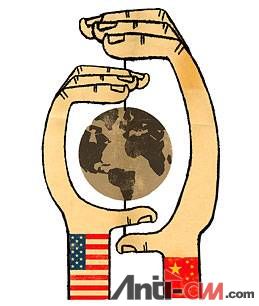【中文标题】观念差异
【原文标题】Perception Gap
【登载媒体】时代周刊
【原文作者】John Lee
【原文链接】http://www.time.com/time/magazine/article/0,9171,1967942,00.html

中美间近期发生了几次小摩擦,最新事件是关于达赖喇嘛访美的话题。在这些摩擦的背后所体现的是两个国家在如何看待自身、如何看待对方,以及如何认识自己在世界上的地位等问题的看法上存在着巨大差异。
美国期望中国可以像日本一样:强大的经济、合作的政治态度、保守的战略意图,以及受压制的军事力量。当华盛顿了解到这完全不现实之后,备选方案出台了。2005年,当时的美国国务卿、现任的世界银行主席Robert Zoellick在一次演讲中简短地透露:让中国心甘情愿地成为一个“负责任的持股人”。美国将确保中国在二次世界大战后建立的国际秩序、法律体系和类似WTO这样的国际组织中受益,而中国必须认识到,支持现存的国际秩序有利于自身的长远发展利益。
这种做法不仅仅是为了维护和平,而且还有其延伸的目的。鉴于其它东亚国家的成功案例,美国认为进一步的经济解放可以带来地区繁荣,同时也会逐渐给中国带来政治改革和对人权更加尊重的态度。
但是,美国对中国经济增长而达到所谓的延伸的目的所报的希望可以说是打错了算盘。带有中国特色的资本主义制度(译者注:这个名词有点意思)与日本和韩国比较起来,把更多的权力和财富分配到政府控制的企业和部门中。北京正在竭力培养国有巨头来统治国内市场,排挤私营经济,目的是让中国共产党(CCP)可以继续控制经济、占据中国社会的特权地位,并把这个国家的财富继续传递下去。这意味着CCP并不认为中国的继续强大需要彻底的经济解放,政治解放就更不用提了,也不认为经济解放将会构建出理想的局面。
于是,就有了一个关于中国的规模和其辉煌历史的问题。华盛顿假设中国的最终命运是具有可塑性的,而共产党则认为这是预先设定、理所当然的。中国聚集了东亚五分之四的人口,是整个东南亚人口数量的10.5倍。它整整统治了亚洲文明3000年,在过去的20个世纪里,中国有18个世纪的经济规模居全球之首。对于一个认为自己是理所当然的亚洲中心的国家来说,期望让它表现得像个负责任的持股人,仅仅会让人们更深刻地了解区域等级制度,美国这个干涉者在上,中国在下。
华盛顿所期望的是永久的美国式和平,一种由美国在亚洲的力量所担保的自由的和平,即使世界上人口最稠密的国家再次出现也难移其志。美国希望中国的最终状态和其它东亚国家一样,它真心地相信这样可以给地区带来永久的稳定和相互间的繁荣。然而它现在抱怨的是中国与世隔绝、只顾维护自身利益、暗中破坏这个体系的受益者。
CCP并不这么认为。在带领世界五分之一人口向繁荣富强的目标前进时,中国创造了自己的发展模板,免费供他人借鉴。当然,这与东亚国家的发展模式大相径庭,更与西方国家的方式不沾边。因此,外国人针对中国的经济改革和政治改革步伐停滞不前的批评其实并不适用。而且,亚洲的美国式平和模式在存在了60年之后,已经不合时宜。与此相比,在北京看来,中国文明的回归自然而然地恢复了亚洲固有秩序。
没有人会否认,从毛泽东开始的中国领导人把中国的复兴称作是“尊严”,这是对中国在亚洲超级实力的注解。但是,尽管亚洲一些国家喜欢看到中国崛起所带来的商业机会,但是他们中的绝大部分都更愿意维持原有的美国式和平。这种由美国人所支撑的国际秩序到目前为止保护了很多弱小的游戏参与者,方法是把他们与势力强大的国家(包括美国自己)利益绑定,遵守被所有人认可的行为模式和争端解决方式。
亚洲国家都在担心,建立在中国文明至高地位基础上的国际秩序最终会变得具有等级意味。目前为止,中国这个依然存在安全隐患,并且内部脆弱的国家基本还是在与商业伙伴维持双赢的关系,目的是安抚内心焦虑的邻居们。但是,如果它的内部发展模板被继续奉行,那么这个由CCP绝对掌握政权和资源,以及不同政见者被粗暴对待的中土帝国,有可能在将来会毫不掩饰地、残酷无情地寻求提升中国国家实力的方法。
原文:
Behind the recent skirmishes between China and America — the latest surrounding the Dalai Lama's visit to the U.S. — lies a wide divide between the two nations over how they see themselves, each other and their place in the world.
The U.S. prefers China to be like Japan: economically powerful and politically cooperative but strategically dormant and militarily inhibited. Knowing that this was never realistic, the second best outcome for Washington — captured succinctly in a 2005 speech by the then U.S. Deputy Secretary of State and current World Bank president Robert Zoellick — would be for China to demonstrate it is a "responsible stakeholder." America would ensure that China benefits from the global system of international rules and laws developed since World War II and institutions like the World Trade Organization. In return, having acquired a stake in this system, China would realize that it is in its own enduring interest to support the pre-existing global order.
This approach is not only designed to preserve the peace. It is also intended to be transformative. As with other East Asian success stories, the U.S. expects that further economic liberalization will bring prosperity, and that this will gradually bring political reform to China and domestic respect for human rights.
But American faith in the transformative power of China's economic rise might be misplaced. Capitalism with Chinese characteristics places far more power and wealth in the hands of the state sector than what has ever occurred in countries such as Japan and South Korea. Beijing is nurturing state-owned champions to dominate domestic markets and crowd out the private sector in order for the Chinese Communist Party (CCP) to keep its economic relevance, privileged status in Chinese society and hands on the country's wealth. This means the CCP does not believe sweeping economic, much less political, liberalization is required for China's continued rise, let alone that it constitutes the endgame.
Then there is the issue of size and China's past greatness. Washington assumes that China's destiny is plastic. Yet, to the CCP, it is predetermined. China is home to four-fifths of the population of East Asia and has 21/2 times more people than the whole of Southeast Asia. It has been the dominant civilization in Asia for 3,000 years and has had the largest economy in the world for 18 of the past 20 centuries. For a country that views its natural place at the center of Asia, expectations that it behave as a responsible stakeholder merely perpetuate a regional hierarchy that places China beneath the (relatively) recent American interloper.
Washington seeks the perpetuation of Pax Americana, a liberal peace underwritten by American power in Asia, despite the re-emergence of the world's most populous country. The U.S. wants the endgame in China to resemble the rest of East Asia — genuinely believing that this will ultimately achieve lasting stability and mutual prosperity — and complains that China remains an insular, self-interested and subversive beneficiary of the system.
The CCP sees it differently. In leading one-fifth of the world's population toward greater prosperity, China is creating its own paradigm that borrows freely, but stands apart, from the East Asian model of development, let alone Western approaches. Therefore, foreign criticisms about poor progress in economic and political reforms do not apply. Moreover, Pax Americana in Asia has been an aberration in existence for only six decades. In contrast, in Beijing's view, the return of the Chinese civilization-state simply restores Asia's natural order.
Few would want to deny what China's leaders since Mao Zedong have termed China's return to "dignity," a reference to the country's re-emergence as a great power in Asia. But even though other Asian states welcome economic opportunities offered by China's rise, the vast majority prefer the preservation of Pax Americana. The American-backed order has hitherto offered protection for smaller players by binding more powerful states (including the U.S. itself) to agreed rules of behavior and processes of dispute resolution.
Asian states worry that an alternative order based on the superiority of the Chinese civilization will eventually become hierarchical. A still insecure and internally weak China has largely pursued win-win economic relationships to appease a nervous region. But if its domestic example is anything to go by — where the authority of the CCP to wield power and control resources is absolute and dissent is harshly treated — a dominant Middle Kingdom might show little future restraint in the relentless quest to enhance China's national power. |